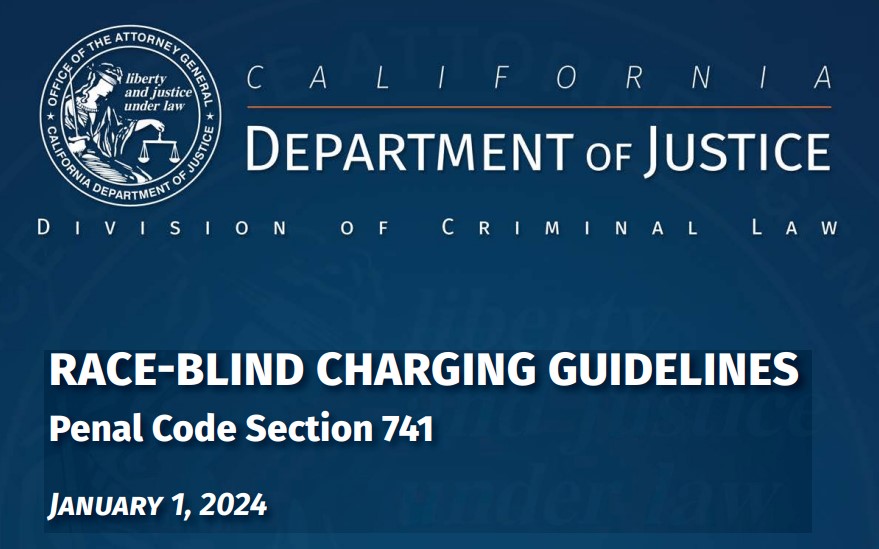CA Attorney General issues Race-Blind Charging Guidelines for prosecutors
Thursday, January 4th, 2024
Two-step process redacts identifying information as required by new state law
OAKLAND – California Attorney General Rob Bonta released Race-Blind Charging Guidelines that address the specific statutory requirements listed in Assembly Bill 2778 (D-McCarty) and Penal Code Section 741, as well as provide prosecutors practical guidance as to how to implement the requirements. The guidelines outline a new two-step process for evaluating charging, including how to redact identifying information, how to document charging decisions, when a crime is excluded from this process, and the requirements to collect and make available for research anonymous data. The guidelines are intended to help reduce the potential for unconscious bias to influence the initial charging decision in legal cases, in accordance with the spirit, law, and goals of PC 741.
“Unconscious bias has no place in the criminal justice system and should not play a role in charging,” Bonta said. “Unfortunately, we know the criminal justice system is not infallible and charging decisions are vulnerable to unconscious bias. This is a reality we cannot ignore and must work to correct. These guidelines will help prosecutors perform their duties in accordance with California law and most importantly, help promote a more fair and equitable charging process for all individuals.”
Studies have shown that unconscious bias may infect decisions within the criminal justice system, despite the best intentions of the parties involved. The guidelines will assist all California prosecution agencies in implementing this new process by January 1, 2025. It includes nine critical components to reduce unconscious bias:
- Redaction of Cases Received from Law Enforcement Agencies and Suspects Criminal History Documentation: Prosecution agencies are required to review initial charging decisions based on information, including police reports and suspect criminal history documentation, from which all direct means of identifying the race of suspect(s), victim(s), and witness(es) race is removed.
- Race-Blind Initial Charging: Prosecution agencies are required to follow a two-step process for charging cases: a “race-blind initial charging evaluation” based on redacted reports and then an “ordinary charging evaluation” based on the unredacted reports and all available evidence. The initial charge evaluation is intended to perform a gate-keeping and recording function prior to the actual charging process. It contemplates an initial evaluation on whether to file any charges, without specifying what charges might be filed. The more thorough second review will be used to determine individual charges or decide charges with certainty.
- Redaction Process for Initial Charging Evaluation: Each prosecution agency must create a redaction process for the materials used in the initial charging evaluation. It must be performed by personnel not association with evaluating or charging the case and may either be done manually or through automation as long as the process ensures correct redaction.
- Use of Artificial Intelligence (AI) Tools for Redaction: If an AI system is used, it must be validated before implementation that appropriate safeguards are in place to prevent unauthorized access to sensitive information.
- Second Review for Charging: After completion of the race-blind initial charging evaluations, the case shall proceed to a second, complete review for charging. This would include a review of unredacted reports and all available evidence, which may include additional materials, such as video footage, photographs, and complete witness statements, that reveals race but must be reviewed to assess whether the requisite elements have been met to warrant the filing of criminal charges. This is the “ordinary charging evaluation” and must be performed by the same prosecutors who performed the initial charging review.
- Documentation of Charging Decision: Prosecution agencies are required to follow a two-step process for charging cases: a “race-blind initial charging evaluation” based on redacted reports and then an “ordinary charging evaluation” based on the unredacted reports and all available evidence. The initial charge evaluation is intended to perform a gate-keeping and recording function prior to the actual charging process. It contemplates an initial evaluation on whether to file any charges, without specifying what charges might be filled. The more thorough second review will be used to determine individual charges or decide charges with certainty.
- Inability to Conduct Race-Blind Initial Charging Evaluation: If a prosecution agency was unable to put a case through a race-blind initial charging evaluation, the reason for that inability must be documented and retained by the agency.
- Collection of Data and Availability for Research Purposes: Each county in which a prosecution agency resides must, on a usual basis, collect the data resulting from the race-blind initial charging evaluation process, except as such information is protected by privilege including, but not limited to, that found in Penal Code section 1054.6. Each county must ensure that the data is collected, stored, and transmitted in a way appropriate to protect sensitive information.
- Exception to the Race-Blind Process: The prosecution agency may exclude the crimes listed at the Penal Code section 741, subdivision (c) from the race-blind charging process. Each prosecution agency may further remove or exclude certain classes of crimes or factual circumstances from a race-blind initial charging evaluation and shall keep a list of the exclusion and their reason for review.
Attorney General Bonta, is committed to fighting for racial justice. In May of 2021 he established the Racial Justice Bureau which, among other things, supports the California Department of Justice’s broader mandate to advance the civil rights of all Californians by assisting with new and ongoing efforts to combat hate and bias. This year, the Attorney General has also engaged with local leaders through roundtables through hate crime roundtables in Bakersfield, Fresno, Anaheim and Irvine.
More broadly, the Attorney General is deeply committed to responding to the needs of historically marginalized and underrepresented communities and, last year, also launched the Office of Community Awareness, Response, and Engagement to work directly with community organizations and members of the public as part of the effort to advance justice for all Californians.
A copy of the Guidelines can be found here.

























